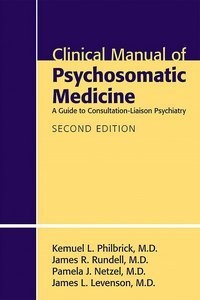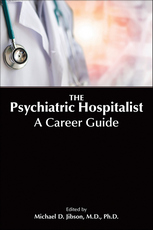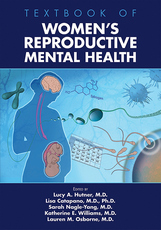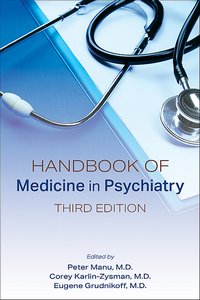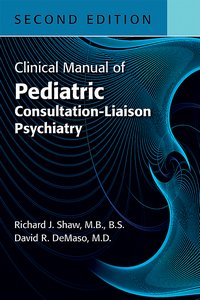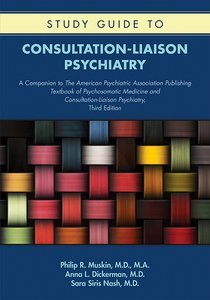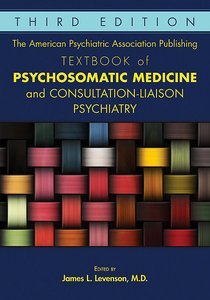Clinical Manual of Psychosomatic Medicine, Second Edition
A Guide to Consultation-Liaison Psychiatry
View Pricing
Description
The Clinical Manual of Psychosomatic Medicine, both educates psychiatrists and mental health professionals practicing in hospital settings about the relationship between physiological processes and psychological and behavioral factors and arms them with the evidence they need to inform hospital administrators about the value of the services they render. Specifically, this new edition:
- Expands the first edition's content to encompass more than two dozen topics most commonly encountered by residents and staff psychiatrists.
- Provides concise information on psychiatric conditions—such as delirium, depression, and dementia—that can interfere with medical care if not addressed.
- Offers a revised format of bulleted lists that maximizes accessibility of critical information so that clinicians can readily locate the required material.
- Emphasizes the core competencies adopted for the subspecialty of psychosomatic medicine (recognized by the American Board of Medical Specialties since 2003) to provide a benchmark for skill development across training programs and academic departments.
- Reflects the way care is most often delivered—by a multidisciplinary team providing evidence-based, individualized treatment focused on either the clinical condition (e.g., obesity) or the treatment setting (e.g., primary care). This emphasis on integrated care contextualizes the information presented in a useful, real-world manner.
Authoritative, practical, and user-friendly, the Clinical Manual of Psychosomatic Medicine is an outstanding resource that equips the clinician with current, concise, relevant data and counsel to guide decision making and optimize care of medical and surgical patients with psychiatric comorbidities.
Contents
- Preface
- PART I: General Considerations
- Chapter 1. Effective Psychiatric Consultation
- Chapter 2. Medicolegal Issues
- Chapter 3. Mental Status and Cognitive Examination
- Chapter 4. Personality and Response to Illness
- Chapter 5. Suicidality
- PART II: Syndromes
- Chapter 6. Anxiety
- Chapter 7. Delirium
- Chapter 8. Dementia
- Chapter 9. Eating Disorders
- Chapter 10. Mood Disorders
- Chapter 11. Sleep Disorders
- Chapter 12. Somatoform and Related Disorders
- Chapter 13. Substance-Related Disorders
- PART III: Treatments
- Chapter 14. Biological Treatments
- Chapter 15. Psychosocial Management
- PART IV: Unique Issues in Psychosomatic Medicine Settings
- Chapter 16. Bariatric Surgery
- Chapter 17. Cardiology
- Chapter 18. Dermatology
- Chapter 19. Disaster and Terrorism Casualties
- Chapter 20. Endocrinology
- Chapter 21. Fatigue and Fibromyalgia
- Chapter 22. Gastroenterology
- Chapter 23. HIV and AIDS
- Chapter 24. Obstetrics
- Chapter 25. Oncology
- Chapter 26. Pulmonary Disease
- Chapter 27. Rehabilitation Medicine
- Chapter 28. Transplantation
- Index
About the Authors
Kemuel L. Philbrick, M.D., is Assistant Professor of Psychiatry at the Mayo Medical School, College of Medicine, and Consultant in Psychiatry at the Mayo Clinic in Rochester, Minnesota.
James R. Rundell, M.D., is Professor of Psychiatry at the Mayo Medical School, College of Medicine, in Rochester, Minnesota.
Pamela J. Netzel, M.D., is Assistant Professor of Psychiatry at the Mayo Medical School, College of Medicine, in Rochester, Minnesota.
James L. Levenson, M.D., is Professor of Psychiatry, Medicine, and Surgery; Chair of the Division of Consultation-Liaison Psychiatry; and Vice-Chair of Psychiatry for Clinical Services at the Virginia Commonwealth University School of Medicine in Richmond, Virginia.
Related Products
Carousel Control - items will scroll by tabbing through them, otherwise arrows can be used to scroll one item at a time
